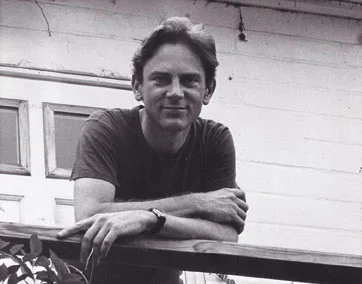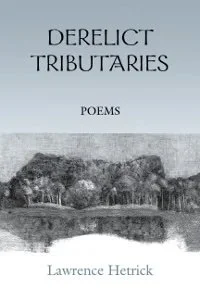Lawrence Hetrick
Lawrence Hetrick grew up in Gainesville, Florida, where his father was professor of entomology at the university and his mother a botanical researcher for the Florida Game and Freshwater Fish Commission. At the University of Florida he studied with Andrew Lytle, Smith Kirkpatrick, Robert Bryan, and John Goggin. After receiving a B.A. in English, in 1962, he did graduate work in creative writing at the Johns Hopkins University, studying with Elliott Coleman and Richard Macksey. He taught briefly at the University of the South (Sewanee, Tennessee) and Miami-Dade Community College before returning to the University of Florida, where he taught the first course offerings in poetry writing in 1967. In 1986 he moved to Atlanta, Georgia, where he taught at DeKalb College. He served as editor of the Chattahoochee Review from 1997 to 2004, receiving the Governor's Award in the Humanities in 2003.
DERELICT TRIBUTARIES
BY LAWRENCE HETRICK
$17.00. (email us for availability)
These beautiful poems are steeped in the dark tannin of loss. Redwater rivers, blackwater rivers -- they carry on, tributaries distributing memories through the sandy landscape of home. The poems are formally measured, with an elegiac economy, quiet Eliotic echoes, the ever-presence of rain, tupelo, eelgrass, sparkleberry, oyster shell, snake. As they sensually evoke the Florida terrain, these elegant poems say there never was a Paradise to lose, we have only ever owned recurrent waves of growth and inevitable regret. -- Sidney Wade
Lawrence Hetrick has given his collection of emptied landscapes, deserted promises, and dilapidated fields an accurate and telling title. Derelict Tributariesportrays a world "as real as what is here / and what is gone from here" with decisive, economical strokes, making a poetry that an artist like Edward Hopper would admire. Underneath the surface lies "an icy hope," but nothing is sentimentalized in this space as lonely as "a radio playing old songs / Till dawn in a dark gas station."
I like this collection immensely! There is something a little Hardyesque about it; the unflinchingness, I guess, but also the strong and lonesome presence of the observer. A strong book! -- Fred Chappell
Canoeing to the Underworld
After a storm
Over windfallen trunks we haul,
Through broken branches, vine bound,
Under, around, between, and over.
After four days hauling, we know
We are doom-devoted. After five,
The river upside down, we slide
Under drowned leaves into cavern
Where flames drip, shadows smoke,
And dark closes like jaws behind us.
Shadow countenances crowd us,
Telling our unlikely futures
That we should be can't believe.
Under their coats more shadows snuggle,
Their unlived lives that look like pets,
Round-eyed and furry, with pointed teeth.
Perhaps we'd like to take one home?
Oh no, we're leaving now, done
Feeding blood to shadows so they speak.
A Visit to the Sandhills
I wake beneath a bare pine bole
Worn as a mule rib in drifted sand,
And my eyes wake rising up it
To find the pale land of the moon.
I can trace each gully and ridge
And hunt arrowheads in ash all day,
Unafraid of ghosts fled there for rest.
Dry ticking wind wakes in scrub oak,
And up the gully track a dust-devil
Whirls toward me. Between oldfield
Plums run ruts soft as flour,
Leaves like insect shells underfoot,
Under wagon wheels crunching,
Jolting over pothole pine roots.
Eventless sky smells like flint.
The wagoner's work is done. He laughs
Over his shoulder at the hilltop house,
Its clapboards silvered and splintering,
Chimneys cracked, windows broken,
Empty rooms howling Never,
The winter sky as blue as ever.


